Understanding the new GB-NI Meat Movement Restrictions
Posted by Emma on 16th Jan 2024 Reading Time:
From 15 January 2024, the trade of meat products between Great Britain (GB) and Northern Ireland (NI) faces new challenges due to the implementation of stricter movement restrictions. Industry professionals have described this change as a significant reduction in the flexibility and efficiency of trade operations.

Previously, meat imports from overseas could be consolidated in a central hub in mainland Britain before being distributed in smaller batches to Northern Ireland for further processing. This practice is now prohibited under the full enforcement of EU regulations. These rules identify such transactions as 'triangular trade', where a veterinarian from one country (in this case, the UK) cannot re-certify meat products originating from another country (like New Zealand) for subsequent shipment to NI.
Efforts to maintain this trade mechanism have been unsuccessful. The UK government did not obtain the necessary concessions within the Windsor Framework to facilitate this type of commerce. The British Meat Processors Association (BMPA) has expressed concerns over this development, labelling it as a further reduction in UK meat businesses' operational and trade flexibility within their own borders. The BMPA highlights that these changes are not just procedural but will have tangible effects on companies.
According to the BMPA, the inability to transfer products between processing locations will necessitate operational adjustments, impacting staffing and facility capacity. This situation could shift jobs and production from Northern Ireland to the mainland, entailing additional costs and potentially contributing to food price inflation. The BMPA criticises these new rules' added complexity and costliness, especially for businesses already operating with minimal profit margins.
The BMPA spokesperson emphasises the need for an alignment agreement with the EU to resolve these inefficiencies. Such an agreement would eliminate the trade barriers introduced post-Brexit, revitalising a critical sector of the British economy.
We invite your insights on this topic. Please share your thoughts in the comments below.

